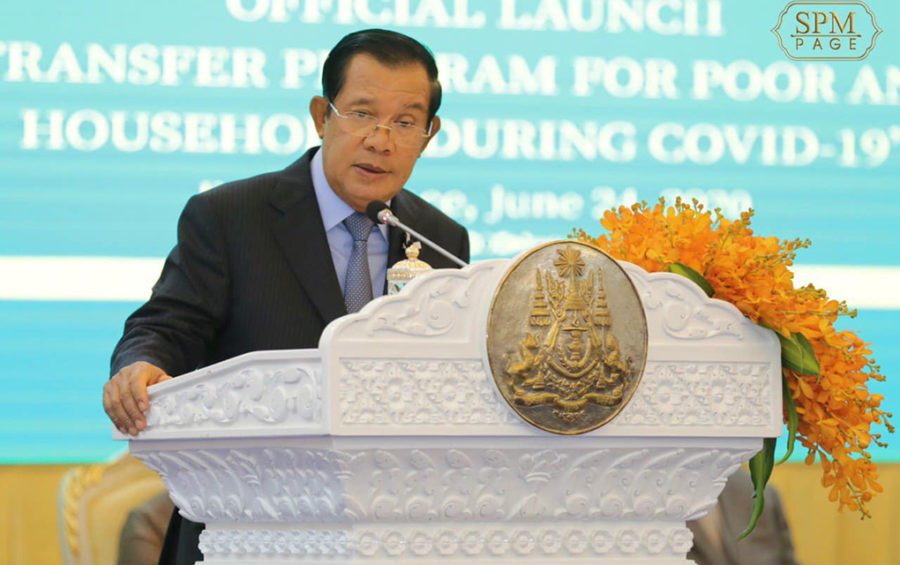Prime Minister Hun Sen said he encouraged banks and microlenders to confiscate property from any borrowers who participate in debt repayment refusal movements and purposefully fail to pay back loans.
One observer questioned how financial institutions would know whether a borrower was making a political statement or merely could not afford to make loan payments, especially during the global economic downturn.
While announcing a $25 million per month package to assist some of the nation’s poorest families, Hun Sen on Wednesday said that while he generally did not want to see debtors face punishments for being unable to pay, he encouraged banks and microfinance institutions (MFIs) to file court complaints in order to confiscate property if they believed a debtor was intentionally avoiding repayments, or inciting others not to repay their loans.
The prime minister said that the banking and microfinance sector would not collapse, as opposition figure Sam Rainsy has posited, because some financial institutions still had sufficient reserves.
“I encourage [you] to confiscate [property] if you believe those [borrowers] made claims or movements [to encourage] not repaying the banks,” Hun Sen said.
“I have just appealed to banks to be understanding during this difficult stage, but repayment still has to be done,” he continued. “But there is a movement of not paying back the banks. I will support the bank to file a complaint to the court to confiscate [collateral] if those people support the policy of that person who made the appeal.”
The premier appeared to be referring to recent statements from Rainsy, a co-founder of the outlawed opposition party, the CNRP. In recent weeks, Rainsy has posted on his Facebook page urging changes in the banking system that would ease the financial burden on struggling borrowers by restructuring loans and delaying loan repayments, as well as calling for borrowers to withhold loan repayments.
In early June, Hun Sen warned that those stirring up social unrest by calling for borrowers not to repay their debts, apparently alluding to Rainsy and his supporters, would be arrested — the same day a CNRP member was jailed.
Rainsy, who has lived abroad since 2015 to avoid various court convictions that he calls politically motivated, encouraged people not to repay their loans during the global Covid-19 pandemic and resulting economic crisis in a post in late May.
“We have to get rid of this miserable regime through a campaign of passive resistance by refusing to repay our debts to the banks controlled by the Hun family on grounds of force majeure,” he said. “This must continue until we have regained the jobs lost through the Covid-19 economic crisis.”
In another post on June 6, Rainsy claimed there was a “looming bankruptcy for microfinance establishments behaving as loan sharks,” alleging that nearly 3 million borrowers were unable to pay back their loans.
“One measure [to respond to the economic crisis] is not to confiscate people’s houses. That is what they have left. Now, they don’t have money to repay. They don’t know where to get the money from,” Rainsy said.
Bun Mony, a board member of the Cambodia Microfinance Association (CMA), said that the prime minister made statements about delinquent borrowers because he was unhappy with people who opposed him. However, Mony said that Hun Sen had actually encouraged MFIs to be lenient with borrowers.
“In fact, he is mild and is advising us to be tolerant with people,” Mony told VOD. “Previously, our association as well as individual MFIs and banks never confiscated [property] or filed any complaint. There were none and instead we delayed repayments and restructured loans.”
Overindebtedness among Cambodian borrowers has been well-documented by researchers and human rights advocates who have called for reforms of the microfinance industry.
A report by two local rights organizations released last year documented more than 20 cases of loan officers coercing borrowers to sell land in order to ensure loan repayments, but MFIs dismissed the report’s findings, saying such incidents were rare.
Mony, who is CEO of Vithey Microfinance Plc., said on Wednesday that 180,000 borrowers have asked for delayed repayments or loan restructuring.
As of May 10, CMA reported that more than 137,000 people had asked member institutions for loan restructuring and over 118,000 clients had their requests granted.
Social researcher Seng Sary said he was concerned that borrowers would face harsh conditions if banks and MFIs confiscated their property while they were reeling from financial loss during the pandemic.
Sary said that before confiscating property — if banks and MFIs were to follow Hun Sen’s directive — they would need to ensure that a borrower is actually making a political statement by not repaying their loans, and not just too poor to pay.
“In this situation, [the government] needs to support them first,” Sary said. “We have to ask, what kind of people [seem to] listen to and were incited by the opposition party? They could be real victims and have no ability to repay.”
In late April, more than 130 civil society groups issued a joint statement, appealing to the government to ensure a suspension of loan repayments and interest accrual on loans for at least three months, and the return of land titles held as collateral by MFIs to their owners. The moves were necessary to help debtors “survive this crisis without risking their health or homes,” and avoid becoming victims of rights violations, the statement said.
More than 2.5 million Cambodians hold microloans with an average loan of more than $3,800, the civil society groups said.
(Translated and edited from the original article on VOD Khmer)












